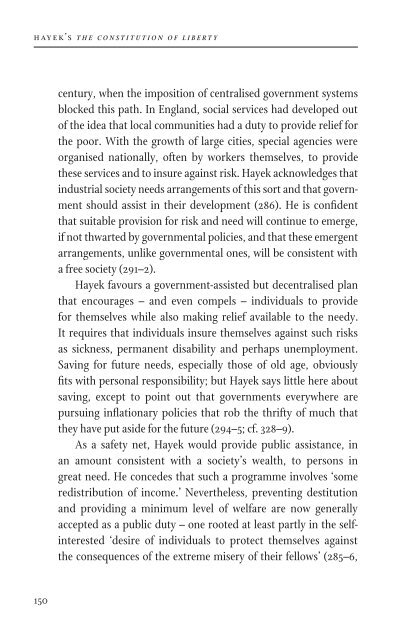Hayek's The Constitution of Liberty - Institute of Economic Affairs
Hayek's The Constitution of Liberty - Institute of Economic Affairs
Hayek's The Constitution of Liberty - Institute of Economic Affairs
Create successful ePaper yourself
Turn your PDF publications into a flip-book with our unique Google optimized e-Paper software.
h ay e k ’ s t h e c o n s t i t u t i o n o f l i b e r t y<br />
s o c i a l s e c u r i t y, t a x a t i o n a n d t h e r e d i s t r i b u t i o n o f w e a lt h<br />
century, when the imposition <strong>of</strong> centralised government systems<br />
blocked this path. In England, social services had developed out<br />
<strong>of</strong> the idea that local communities had a duty to provide relief for<br />
the poor. With the growth <strong>of</strong> large cities, special agencies were<br />
organised nationally, <strong>of</strong>ten by workers themselves, to provide<br />
these services and to insure against risk. Hayek acknowledges that<br />
industrial society needs arrangements <strong>of</strong> this sort and that government<br />
should assist in their development (286). He is confident<br />
that suitable provision for risk and need will continue to emerge,<br />
if not thwarted by governmental policies, and that these emergent<br />
arrangements, unlike governmental ones, will be consistent with<br />
a free society (291–2).<br />
Hayek favours a government-assisted but decentralised plan<br />
that encourages – and even compels – individuals to provide<br />
for themselves while also making relief available to the needy.<br />
It requires that individuals insure themselves against such risks<br />
as sickness, permanent disability and perhaps unemployment.<br />
Saving for future needs, especially those <strong>of</strong> old age, obviously<br />
fits with personal responsibility; but Hayek says little here about<br />
saving, except to point out that governments everywhere are<br />
pursuing inflationary policies that rob the thrifty <strong>of</strong> much that<br />
they have put aside for the future (294–5; cf. 328–9).<br />
As a safety net, Hayek would provide public assistance, in<br />
an amount consistent with a society’s wealth, to persons in<br />
great need. He concedes that such a programme involves ‘some<br />
redistribution <strong>of</strong> income.’ Nevertheless, preventing destitution<br />
and providing a minimum level <strong>of</strong> welfare are now generally<br />
accepted as a public duty – one rooted at least partly in the selfinterested<br />
‘desire <strong>of</strong> individuals to protect themselves against<br />
the consequences <strong>of</strong> the extreme misery <strong>of</strong> their fellows’ (285–6,<br />
303). <strong>The</strong> assured minimum level <strong>of</strong> assistance should be uniform<br />
and should be extended only in cases <strong>of</strong> ‘proved need.’ Hayek<br />
endorses means tests for welfare eligibility, despite their reliance<br />
on discretion, and rejects the widespread notion that such tests<br />
are degrading (301, 303–4). Defining need is particularly difficult<br />
in the area <strong>of</strong> healthcare, where medical advances have made it<br />
‘more and more clear that there is no limit to the amount that<br />
might pr<strong>of</strong>itably be spent in order to do all that is objectively<br />
possible’ (298). Here the benefits to the individual <strong>of</strong> additional<br />
treatment must be weighed against the costs, but the individual<br />
himself should ‘have a say’ in this decision ‘and be able, by an<br />
additional sacrifice, to get more attention’ (299).<br />
On the question <strong>of</strong> helping the unemployed, Hayek is<br />
unwilling to extend relief beyond the uniform minimum that is<br />
assured to all, except perhaps in a major depression. He opposes<br />
such additional relief partly because it distorts the labour market<br />
and partly because it subsidises the extravagant wage demands <strong>of</strong><br />
labour unions. Hayek does welcome genuine insurance against<br />
unemployment wherever this is practicable (300–302).<br />
Because public assistance is extended to all, insuring against<br />
risk must be compulsory. Hayek reasons that if public relief is<br />
available even to needy individuals who neglect to help themselves,<br />
some will fail to make provision against emergencies and<br />
many may do so inadequately. <strong>The</strong> obvious solution is ‘to compel’<br />
individuals ‘to insure (or otherwise provide) against’ the hazards<br />
associated with old age, unemployment, sickness and so on. As<br />
noted earlier, Hayek justifies such coercion on the same principle<br />
that he had used earlier in justifying taxation and compulsory<br />
military service. Although ‘the community’ may not force a person<br />
to act in his own interest, it may nonetheless compel him to do<br />
150<br />
151












